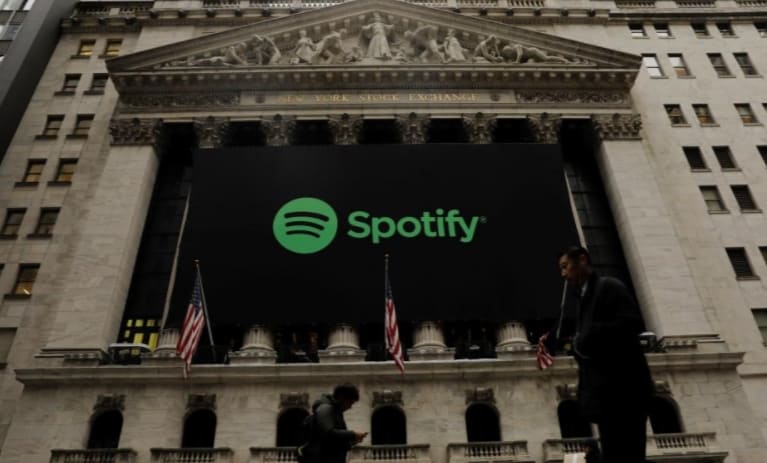
Shares of Spotify Technology SA ended up 12.9 percent on their first day of trade on the New York Stock Exchange, a smooth debut that could pave the way for other companies looking to go public without the aid of Wall Street underwriters.
Spotify shares opened at $165.90, up nearly 26 percent from a reference price of $132 set by the NYSE late on Monday. The stock ended the session at $149.01, valuing the world’s largest streaming music service at $26.5 billion.
The direct listing was seen as a test case for other companies tempted to list without selling new shares, and for bankers that could lose out on millions of dollars in underwriting fees for future initial public offerings.
“It’s a fair market price. It’s not manipulated or set by any puts and takes by banks or institutional investors,” said Chi-Hua Chien, an early investor in Spotify who is now at San Mateo, California-based venture capital firm Goodwater Capital.
Some market-watchers cautioned investors not to read too much into the first day of trading, given the mixed performance of recent tech IPOs and an increasingly competitive music streaming landscape.
HEMORRHAGING COSTS
The direct listing by the Stockholm-founded company was the largest on record. Spotify now has a higher market value than Snapchat owner Snap Inc, which went public last year. Facebook Inc and Alibaba Group Holding Ltd remain the largest tech stock listings in recent years.
Since launching its service a decade ago, Spotify has overcome resistance from big record labels and some major music artists to transform how people listen to music. But it still does not make a profit and faces intense competition from Apple Inc and others.
“Investors are right to have some reservations. Spotify is from the costs of licensing content,” said Michael Carvin, chief executive of personal finance technology firm SmartAsset. “Even though Spotify’s scale is about twice that of Apple Music, Apple has a huge ecosystem of products to market to.”
Spotify has 71 million so-called premium subscribers, including users who have given the company a credit card number for a free trial. On a comparable basis the Apple Music service has 46 million subscribers.
Amazon Music Unlimited has an estimated 16 million paying subscribers and Pandora has 5.48 million total subscribers. Alphabet Inc’s Google does not release paid subscriber numbers for Google Play Music.
HEAVY TRADE
After the listing, Spotify has an enterprise value – which takes into account cash and debt on the company’s balance sheet – of about five times its 2017 revenue of $5 billion.
That represents a premium to smaller rival Pandora Media Inc, which has an enterprise value-to-sales ratio of one, but is far less than a comparable ratio above 10 for Netflix Inc and Dropbox Inc.
Analysts had worried ahead of Spotify’s direct listing that forgoing underwriters and traditional promotional events designed to stimulate interest from institutional investors could mean volatility once formal trading kicked off.
The NYSE set Spotify’s reference price late on Monday to be in line with informal, private trading of Spotify shares, giving an early estimate of the level at which supply and demand could be balanced.
The opening public price was determined by buy and sell orders collected by the NYSE from broker-dealers and a designated market maker’s determination of where buy orders could be matched with sell orders.
Nearly 30 million shares had changed hands by the end of regular trading hours. Some 91 percent of Spotify’s 178 million shares were tradable, a much higher percentage than typical in a traditional IPO.
While Chief Executive Daniel Ek skipped NYSE rituals such as opening bell-ringing and trading floor interviews to tout the stock, the front of the 115-year-old Greek Revival exchange building was draped in a vast green-and-black Spotify banner.
The only visible hiccup came when the NYSE also briefly flew a Swiss flag in honor of the Swedish company, which the NYSE later described on Twitter as a “momentary ode to our neutral role in the process of price discovery.”
